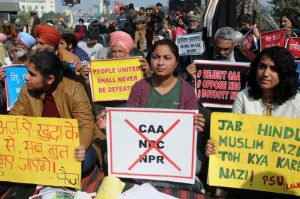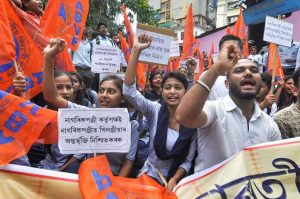NRC Fallout – In a stark example of the lingering uncertainty surrounding Assam’s National Register of Citizens (NRC), a woman originally from West Bengal has been forced to leave the state of Assam after her citizenship plea was rejected. The case has triggered political outrage in West Bengal and reignited debates around identity, legality, and human rights in India’s northeastern border states.
Arati Das, a 52-year-old woman from Cooch Behar district, had lived in Assam for over three decades after marrying an Assamese man. Despite her long-standing residence and familial roots in the state, she was served a Foreigners’ Tribunal notice, branding her an illegal immigrant and compelling her to return to her native Bengal.
NRC Fallout: A Life Displaced
Arati Das’s story is not an isolated one, but it has come to symbolize the deeply personal tragedies resulting from systemic issues surrounding the NRC process. She married into an Assamese family in 1991 and has lived continuously in the state since then. Her husband is a local resident of Assam, and her in-laws’ family roots can be traced back to multiple generations within the state.
However, when the updated NRC process began in Assam, Arati’s name was excluded. A tribunal notice followed, and despite her efforts to provide documents and proof of residency, her plea was ultimately rejected. With no legal recourse remaining and under pressure from local authorities, she was forced to pack up and leave her home of 34 years.
The move has been emotionally and financially devastating for her family. Arati now lives in her paternal village in Cooch Behar under the care of relatives. Her husband, still in Assam, remains distraught and isolated, with little clarity on how or when the family might reunite.

Legal and Bureaucratic Challenges
Arati’s exclusion from the NRC highlights the deeply complex nature of proving citizenship in Assam. A key challenge for many, especially women, lies in the burden of documentation. Married women who move after marriage often lack proof of pre-marriage identity linkages such as school certificates or voter ID entries in their maiden names. Despite presenting affidavits and familial records, these are often deemed insufficient by tribunal courts.
In Arati’s case, records from her paternal family were available, including proof of her father’s service in a government school in West Bengal dating back to the 1960s. However, because her linkage to those documents could not be conclusively established after her marriage—when she adopted her husband’s surname and address—she was declared a non-citizen.
Legal experts have raised questions about the functioning of Foreigners Tribunals in Assam, pointing to inconsistencies in verdicts, lack of standardization in evidence acceptance, and the absence of gender-sensitive procedures. In many cases, the testimony of women or documents from maternal homes are either ignored or given low evidentiary value.


Political Backlash in Bengal
The incident has sparked a major political backlash in West Bengal. State Finance Minister Chandrima Bhattacharya publicly condemned the decision, calling it “a gross violation of constitutional rights” and questioning whether marriage to an Assamese man now disqualifies a woman from claiming Indian citizenship. She accused Assam’s government of targeting Bengalis under the pretext of the NRC process.
West Bengal’s Migrant Workers’ Welfare Board has taken up Arati’s case, vowing to challenge it through political and legal channels. The board, along with state government officials, is coordinating with civil rights groups and legal aid organizations to explore the possibility of petitioning the courts or raising the matter at the central level.
This incident also coincides with West Bengal Chief Minister Mamata Banerjee’s decision to lead a large-scale protest rally on July 16 in Kolkata. The protest is being organized to raise awareness about the alleged harassment of Bengalis in Assam and to demand a national policy ensuring the protection of legitimate Indian citizens across state lines.
Assam’s NRC: The Wider Picture
The National Register of Citizens in Assam was designed to identify “genuine” Indian citizens and detect illegal immigrants, particularly those who may have entered India from Bangladesh after March 24, 1971. The NRC process, which culminated in 2019 with the exclusion of nearly 19 lakh people from the final list, has faced significant criticism over its implementation.
While the stated goal of the NRC was to address concerns about undocumented migration, critics argue that it has created confusion and hardship for many legitimate residents of the state—especially women, tribal communities, and economically disadvantaged groups.
Doubtful Voter (D-voter) tags, inconsistent records, and lack of access to proper documentation have led many to lose access to citizenship benefits. Those excluded must prove their citizenship through a quasi-judicial process that many say lacks transparency and fairness.
The central government has yet to provide clarity on what will happen to individuals left out of the final NRC, and legal uncertainties continue to dominate the post-NRC landscape in Assam.
Voices of Concern
Civil society groups in both Assam and West Bengal have spoken out in support of Arati Das and others in similar situations. Human rights lawyers have emphasized the need to establish better protocols for handling documentation issues and to offer stronger protections to vulnerable individuals, particularly women who move states due to marriage.
There is also growing concern about the extension of NRC-like procedures to other states, as proposed by some political quarters in India. Legal experts warn that without structural reform and better data systems, replicating Assam’s experience elsewhere could create massive administrative and humanitarian problems.
Meanwhile, families like Arati’s remain caught in the crossfire—bearing the brunt of policy confusion, bureaucratic rigidity, and political polarization.
Impact on Families and Society
The emotional toll of these citizenship disputes is staggering. For Arati, separation from her husband and her home of over three decades has led to anxiety, social alienation, and financial strain. Her neighbors in Cooch Behar have welcomed her with compassion, but she remains deeply unsettled, uncertain about her future or her legal status.
Her story is also being viewed as a case study by activists and policy researchers examining the gendered impact of citizenship laws. Women’s dependence on male-dominated records—husband’s name, father’s land, or village patriarchal registers—puts them at disproportionate risk when facing legal scrutiny.
The impact on children is equally harsh. Although Arati’s own children are reportedly safe from tribunal action, in other cases across Assam, children of “declared foreigners” have also faced rejection during documentation verification, leading to entire families being split across legal categories.
Looking Ahead
The case of Arati Das has become emblematic of the unintended consequences of a policy designed to address a complex historical issue. It has reignited conversations around due process, documentation, and the need for humane implementation of administrative decisions.
As her story gains traction, pressure is mounting on both state and central governments to provide clarity, restore justice, and prevent similar situations in the future. Whether through judicial intervention, political advocacy, or policy reform, stakeholders across India are calling for urgent action.
The fate of Arati Das now lies in the hands of government officials, legal forums, and public conscience. Her story—of love, migration, belonging, and rejection—serves as a sobering reminder that citizenship is more than a document. It is the right to belong, to live with dignity, and to be recognized by the land you call home.
External Links
- Times of India: Bengal woman made to leave Assam after NRC plea rejected
- Times of India: Didi to lead July 16 rally against B’deshi tag on Bengalis
- Wikipedia: NRC in Assam
- Government of Assam: NRC Information
Also read: Home | Channel 6 Network – Latest News, Breaking Updates: Politics, Business, Tech & More

